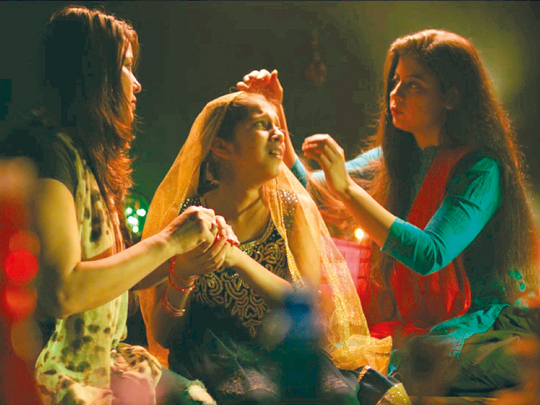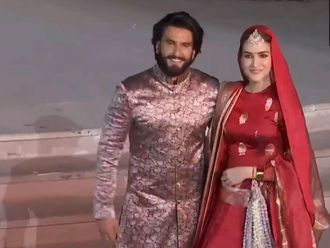
Scenes that show the truth are often the hardest to digest. But we live in a world where a child goes missing every eight minutes in India — a nation that is a source, destination and transit country for child trafficking.
“This needs to be talked about — and that’s why I’ve made Pakhi,” says Sachin Gupta, the writer, producer and director of the crime drama.
The film is based on the real stories of victims of child trafficking and the rapid increase in the number of victims following natural disasters. The story revolves around 10-year-old Pakhi, who is trafficked from Nepal following an earthquake and forced to marry a 55-year-old man.
Not your typical Bollywood film
Gupta, an Indian National Award-winning director, admits the film is a significant departure from the light-hearted productions that currently dominate Hindi cinema.
“It’s not a love story. There are no romantic interests or love triangles. But you will feel the chills as you experience the menace of the lead character, Bali,” Gupta explains. “Imagine actually seeing into the life and dark mind of person who kidnaps and sells young children to be sexually exploited. Can you?”
Bali, the child trafficking don, is played by debut actor Sumeet Kant Kaul. Hailing from a lineage of cinematic talent, Kaul is the maternal great grandson of Yeshwant Pethkar, an acclaimed director, writer and actor who began making movies in 1947 and was behind the likes of Aage Badho, which gave Dev Anand his big break.
The film also stars Anamika Shukla, Anmol Goswami, Pallavi Das, Pihu Dutta and Sandeep Bhaudaria.
“I needed an actor who could simultaneously terrify and entertain, and make the audience believe he’s actually doing all the horrible things his character is doing,” Gupta says. “We always remember the bad guy, even from the films we watched as children. Sumeet’s performance is that of a bad guy you’ll never forget.”
A healer debuts in bold negative role
Kaul, a theatre artist, healer and motivational speaker, says he drew his inspiration from Heath Ledger’s Joker from Batman, while also channelling the darkness of Ravan, the chief villain of Hindu epic Ramayana.
“I began to live the character of Bali, and as a method actor I used to imagine this character being equivalent to 100 Ravans,” he explains.
Asked about his unique choice for a debut film, Kaul says he believes Bali is possibly the best way to showcase his acting prowess that’s a significant contradiction to his healer persona. Through his character, he promises to show how rampant the issue of child trafficking really is in his country to drive change.
“For an actor there are no positive or negative roles,” he says. “They’re just roles and one needs to be honest to the craft.”
More importantly, Kaul adds that Pakhi is “statement film by an award-winning director” and he’s honoured to represent such a powerful subject. “It’s unconscionable that this is happening and I believe cinema does more than entertain. It has the power to influence thinking, change hearts — and even society.”
Censor blocks release
Jarring scenes show the gruesome reality of traffickers forcibly administering hormone injections to induce early puberty among minors, as well as increased vulnerability based on socioeconomic factors where little girls are sold for even as little as Rs2,000 (Dh104).
However, it’s this very spotlight on the truth that has resulted in the film’s release being delayed from its August 10 date because it was dubbed “too crude” by India’s Central Board of Film Certification. While Gupta insists the film contains no nudity, violence, graphic scenes or offensive language, the censor has yet to revisit its decision. Meanwhile, a campaign of billboards across India asking for #JusticeForPakhi has gone viral across the nation urging the censor to allow the truth to be screened.
“Unless a character is evil enough to make you question life itself, one cannot see the need to work for change,” says Kaul. “The sheer horror Bali has you feeling on screen shows exactly what victims go through, which is crucial for people to understand the reality of what is happening in the world they live in.”













